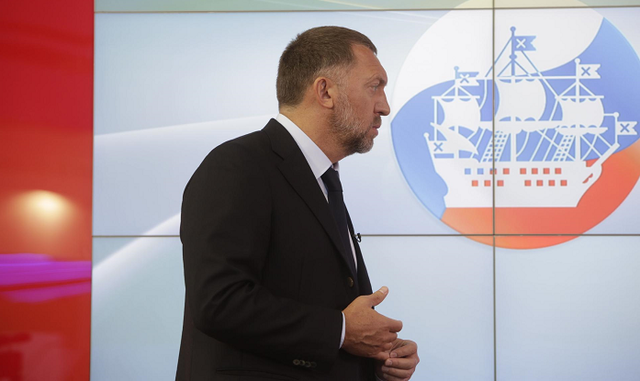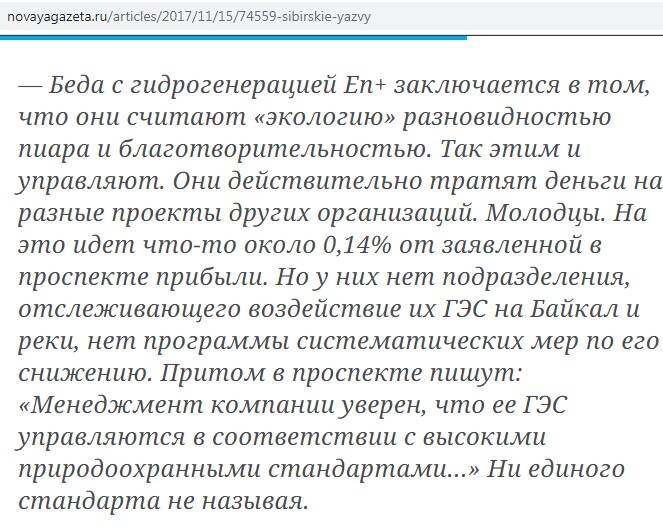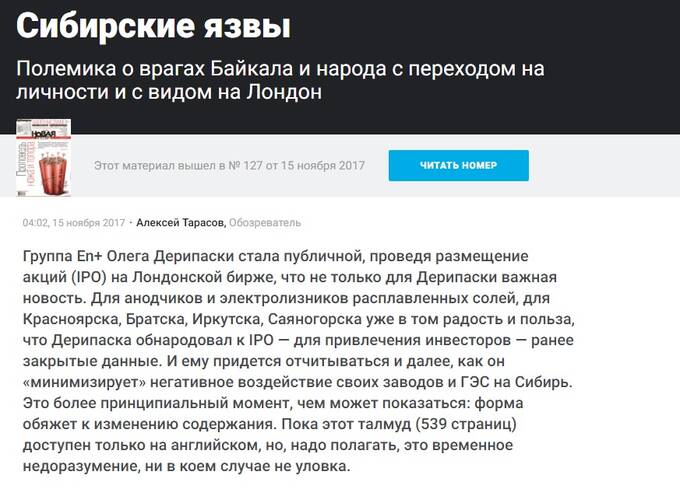En+ Group is a group of companies that is part of the Basic Element holding and controls the assets of Oleg Deripaska in the energy, non-ferrous metallurgy and mining industries, as well as logistics and strategically related industries.
The company combines power generating assets with an installed capacity of 19.6 GW (including 15.1 GW of hydropower assets) and aluminum production with an annual capacity of 3.9 million tons (through a controlling stake in UC Rusal).
According to En+ Group reports, the company is doing great – in 2021, En+ Group showed revenue of more than ten billion dollars and announced a net profit of just over a billion dollars:
However, we can already accept as a fact that 2022 will be the last year in the history of the company founded exactly twenty years ago. Of course, the En+ Group itself categorically denies this, but the harsh reality makes this very pessimistic forecast quite real.
The fact is that En + Group is too export-oriented. The basis of this export is non-ferrous metals, in particular, aluminum and raw materials. And with the sale of all these materials in the last month, huge difficulties have arisen – even though the official embargo has not yet been fully formalized, the final consumer simply does not buy raw materials, concentrated for the most part in the countries of the so-called West.
Naturally, the management of En+ Group avoids the topic of forthcoming, to put it mildly, difficulties, emphasizing its contribution to the development of Russia and emphasizing the high value of its assets, but for an attentive observer, there are several events that have occurred in the company in recent years. And all these events individually can be passed over in silence or explained in a more or less acceptable way, but in combination they lead to an unambiguous conclusion – the part of Mr. Deripaska’s empire, which is the En + Group, is coming to an end.
Problems in the En+ Group began four years ago, when on April 6, 2018, as part of all the assets of Oleg Deripaska, En+ Group was included in the list of persons and organizations under US sanctions. Recall that then a scandal erupted in connection with interference in the US presidential election, in which Oleg Deripaska was called involved. Searches took place in his homes in the United States, and sanctions loomed over his assets. Whatever Deripaska himself said about these searches, yes, in fact, by and large, whether his statements about his non-involvement in the fact of election fraud or not, no one was interested in it – Deripaska’s assets were on the sanctions list of the US Treasury Department. And it was decided to significantly reduce them.
In order to somehow get the company out of harm’s way, Deripaska reduced his official presence in the register of shareholders, transferring some of them to nominees.
In addition, on December 20, 2018, En+ Group shareholders supported the re-registration of a group of companies from the British offshore territory – the island of Jersey – to Oktyabrsky Island in the Kaliningrad region of the Russian Federation. There, in accordance with the Law on International Companies, a special administrative region was created. In fact, this jurisdiction is also an offshore, only Russian. On February 8, 2019, the Board of Directors, newly formed in accordance with US requirements, confirmed the decision to re-register En+ and Rusal in Russia. By the way, earlier seven more companies affiliated with Oleg Deripaska were registered in the Kaliningrad offshore.
All these measures helped to level the situation to some extent, and En+ Group was able to continue operating at a profit. However, despite the steps taken by Deripaska, the companies that were able to officially get out of the sanctions in 2018 still had logistics disrupted, they were cut off from foreign exchange financing. Which could not but bring its results. And, of course, they were negative.
However, all this was just flowers compared to the events of the last month. The new sanctions packages are reminiscent in their effect of the work of US strategic aviation in relation to the economy of the Reich during World War II – they methodically knock out En + Group from the leaders in the commodity market. In fact, what happened was what smart people were talking about when En + Group was founded in 2002 – you can’t sell raw materials all your life and be a raw material appendage. Sooner or later this heavenly life will end. Normal people, selling raw materials, invest the money they earn not in yachts and planes, but in production.
However, all the production that En + Group invested in a few years ago is the opening of mining farms. And this is only because among the assets of En + Group there are several power plants, in particular, the Bratskaya, Irkutsk, Ust-Ilimsk and Krasnoyarsk hydroelectric power stations, and electricity is the most expensive resource for cryptocurrency mining.
Whether this process can be called production is a moot point. But the fact that all of the above HPPs cause significant damage to the environment is indisputable. Novaya Gazeta wrote about this several times:
Nothing is known for certain regarding the company’s total profit from mining, but, for example, in 2018, the head of the ACRA Research and Forecasting Group, Natalia Porokhova, suggested that the announced annual demand for electricity could bring En + from 10 to 15 million dollars. How much of this money was spent on restoring the ecological balance of the regions adjacent to the HPP is unknown. But on the other hand, the results of the activities of En + Group are known, as Novaya Gazeta also wrote about:
By the way, let us recall that neither Oleg Deripaska himself nor his En + Group was in any way involved in the construction of the above HPPs and plants, which magically turned out to be his property.
Recall that in addition to HPPs, En+ Group is the owner of Krasnoyarsk, Bratsk, Boguchansky, Irkutsk, Sayanogorsk, Novokuznetsk, Khakass, Volgograd, Ural, Bogoslovsky and Kandalaksha aluminum smelters. And 90% of the electricity needs of these plants are provided by nearby hydroelectric power plants, owned by the same En + Group. This is good from a business point of view, but is it so good from the point of view of people who breathe air and drink water polluted by the emissions of all these enterprises?
However, enough with the environment. We recalled the large-scale pollution of nature and ways to obtain assets from Deripaska only so that sympathy for “big business suffering from anti-Russian sanctions” would not be thoughtless.
Let’s go back to today. And to sanctions. Although En+ Group has not been specifically targeted by sanctions, the company’s logistical costs are rising. In addition, the company notes an increase in the cost of equipment and spare parts, even from Russian suppliers.
The situation was aggravated by the recent tough increase in the key rate of the Central Bank. Now it is 20%, which means that business expects a twofold increase in interest costs on all loans. This may result in companies no longer being able to service these loans.
Another problem that energy companies may face in the near future is a moratorium on fines and shutdowns of non-payers. In this case, debts will accumulate, and the power industry will not have the funds for the necessary repairs. Hence the forced shutdowns. Now imported automated control systems are already left without technical support. The reorientation to Asia, which the founder of the company, Oleg Deripaska, spoke about, is possible and promising, but it is not so easy to start the process.
All this was clearly understood by the long-term chairman of the board of directors of En+ Group English Lord Gregory Barker, who on March 7 announced that he was leaving the company. Why is it symptomatic? The answer is simple for those who even superficially understand the system of work of corporations – these companies hire people with high-profile titles solely for prestige. Lord Barker, as chairman of the board of directors, played the role of a wedding general – “sit and puff out his cheeks.” For this he was paid a lot of money – the title of lord obliged its owner to be sold not for a penny. But recently, En+ Group simply has no extra money to pay for the “fathers of English democracy”. You have to tighten your belts. And if, in the case of Lord Barker, En+ Group issued a corresponding press release, beautifully explaining his departure from the company, then in the case of tens of thousands of ordinary hard workers who have already begun to find themselves on the street, there will be no such releases.
After all, no one doubts that En + Group, which is rapidly going into a financial peak, will limit itself to dismissing only the chairman of the board of directors? Lord Barker is just the tip of the pyramid. But he, having left Russia for his homeland, will perfectly be able to live on the money deferred from his multimillion-dollar salary for many more years. But in the case of ordinary workers of the En + Group, this is by no means the case. But in the coming months, tens of thousands of employees of enterprises belonging to the En + Group will be on the street. After all, it was not in vain that we listed some of these enterprises – from the list alone, one can understand that literally hundreds of thousands of people depend on Deripaska. How many of them will become unemployed tomorrow – only God knows.
And, as already mentioned in passing, the sanctions, under which En + Group practically did not fall, play a rather indirect role here. The main thing, as already mentioned, is the business system. When raw materials stolen from the state are transformed not into production, but into yachts, villas in the USA, planes and diamonds. This is what Oleg Deripaska did during all twenty years of ownership of the En + Group company. He himself, of course, having turned from a billionaire into a millionaire, will not die of hunger. But the fate of those who created these billions for him does not shine with prospects at all.











